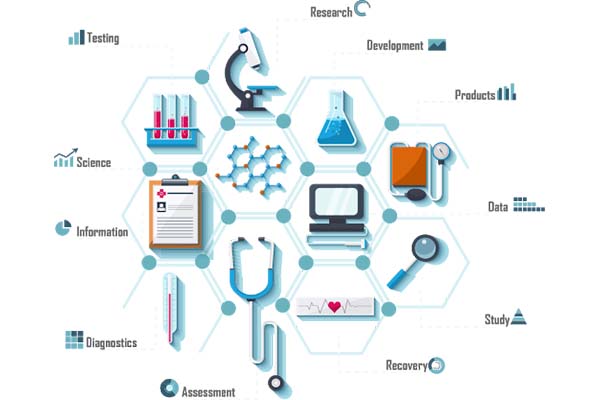3 Advanced trends Blockchain brings to Healthcare
- Enriched Medical Supply-Chain
- Growing Capabilities
- Improvised Clinical Trials

The components of a blockchain are ledger, transaction blocks, transaction chains, public-key cryptography, hash functions, Merkel tree, and zero-knowledge proof. Each component of the blockchain has varied functions. Blockchain defines a volume of data as blocks linked or chained together through cryptography. Each link is called a hash, is stored in a ledger, and is supported by a network. A copy of the data storage is in a connected network, called a node. The node frequently updates the data with sync.
Blockchain in healthcare isn't like other programming interfaces. It helps in reducing healthcare costs, streamline business processes, and improve accessing information. Blockchain is one platform meant for all healthcare stakeholders. It is a new understanding of design patterns, data sharing, and implementation.
Blockchain was invented in 2008 to serve as the public transaction ledger of the crypto currency. Even after its public debut, blockchain took the popular stand. After years of evolution, now blockchain technology has a place in every commercial network.
The tremendous potential in blockchain has led to the healthcare industry adopting it. Blockchain in healthcare has recently bought along with it several benefits.
Advances of Blockchain in the Healthcare Industry:
 An Enriched Medical Supply-Chain
An Enriched Medical Supply-Chain
The challenges the healthcare sector faces from drug and medical equipment supply is a loop of unending issues. The healthcare sector has always dealt with the challenge of efficient supply.
The challenges Healthcare deals within Supply
Product Visibility
The core problem of supply chains is always the lack of visibility of where a product is coming from to where it is going, and what it is. Drug shortages, counterfeits, and Opioid in the USA for the past year have been an issue.
Coordination in Logistics
One seller distributes a single drug or treatment to over a hundred hospitals, but with over 7,000 healthcare facilities, it is tough to keep track of each buyer’s requirements. For instance, some hospitals may want the product to arrive before they start treatment, while some hospitals may start the treatment by relying on on-time delivery. Different requirements and lack of logistics coordination make any change difficult to implement.
Compliance
The FDA [Food and Drug Administration] issue rules that not only manufacturers must comply with but also shippers and distributors. The Drug Supply Chain Security Act requires any company wishing to sell pharmaceuticals in the USA to facilitate product traceability.
The enforcement of the law gives suppliers and distributors new standards for traceability and serialization with significant changes. This will be an immense effect on the investment through the supply chain.
How Blockchain has enhanced the Supply Chain
These are some of the major issues a medical supply chain has to overcome to reach the destination. The blockchain technology does not solve all these problems but enhances them. Though only the future sees a perfectly compatible blockchain, healthcare has developed an enriched supply change management.

Blockchain technology has a bigger role to play in supporting the digitization of supply chains, which can increase transparency and efficiency. Complying with The Drug Supply Chain Security is a much easier task to comply with, when tracing a product is easier with blockchain. Healthcare organizations, from manufactures to retailers, can trace products to ensure it isn't damaged, has a quality issue, or anything more.
 Growing Capabilities
Growing Capabilities
Every business in every sector has adopted a digital strategy to be ahead of the competition. Digitization gives businesses capabilities. Along with capabilities arrive expectations. A hospital advanced in technology is expected to cure an illness quicker than a hospital which is a little more backward.
Blockchain technology has worked effectively for healthcare in this aspect. Blockchain has the potential to uncover demographic trends and speed up research and development in the healthcare sector. Implementation of one technology can help healthcare facilities to supplement more technologies, such as Artificial Intelligence and hybrid cloud solutions.
 Improvised Clinical Trials
Improvised Clinical Trials
Clinical trials are complicated. They accompany a multitude of tedious tasks, like, data management, bookkeeping, reporting, and much more. Blockchain has the ability to integrated manage all these tasks. In recent years blockchain has enabled clinical trials with integrity, transparency, automated report generation, and many other routine processes. All these processes eventually reduce the pressure on manual tasks.
Blockchain in 2020 can help resolve the most important issue of clinical trials: finding precise candidates. Blockchain adoption can enforce data interoperability for better patient identification and many more purposes. Clinical trials, waiting to test alternative medicine and inventions for a cure, do not need the wait or the search anymore, with blockchain.
 Wrap Up
Wrap Up
Though blockchain is at its nascent stage, it is a stepping stone to success in the healthcare sector. Now comparatively fewer healthcare facilities have adopted blockchain. In the coming years, we can see a multitude of healthcare settings adopting blockchain to enhance their services and efficiency.
It might not be an easy process to make blockchain a common technology in the healthcare industry. After every storm comes the rainbow and adoption of the blockchain will lead the Healthcare industry to impactful outcomes. Success in the healthcare sector isn’t merely success in that sector it is uplift to the society and the economy.
The healthcare sector plays a major part in providing the most important service. It also provides business opportunities for other businesses. Blockchain technology can make the healthcare sector swift and secure, like never before.
